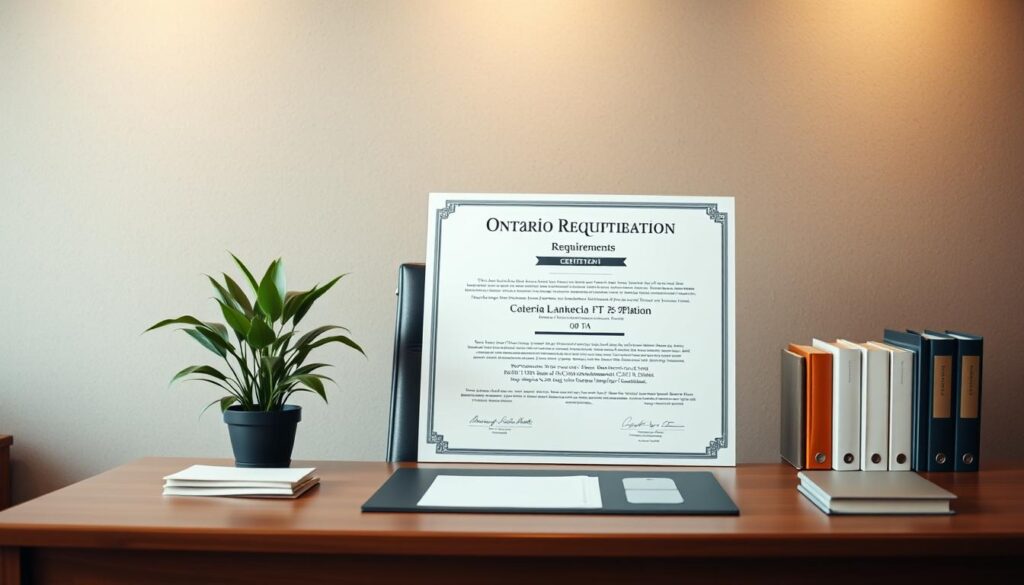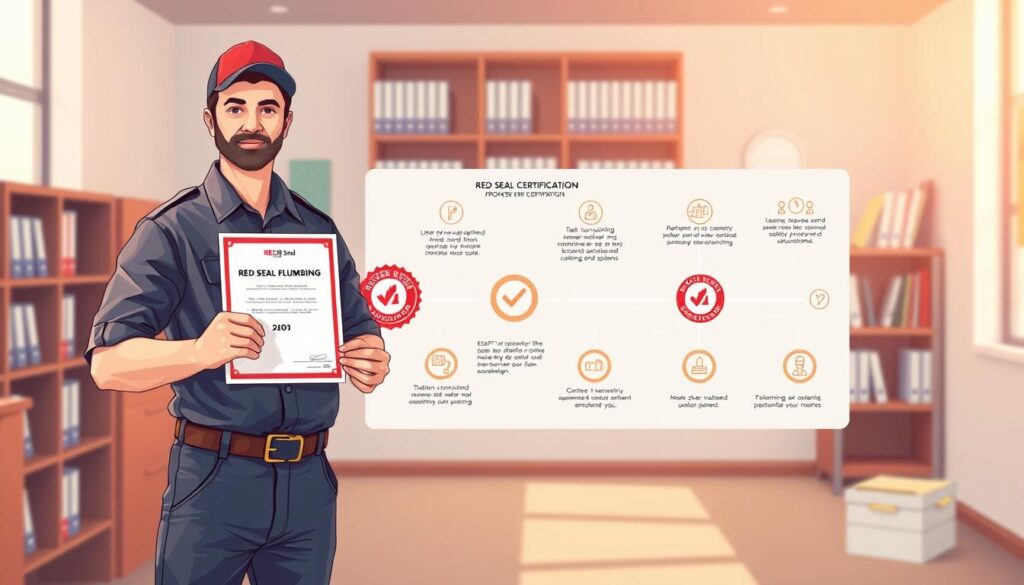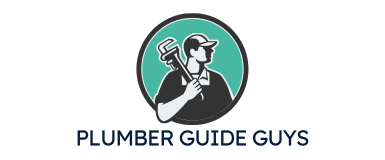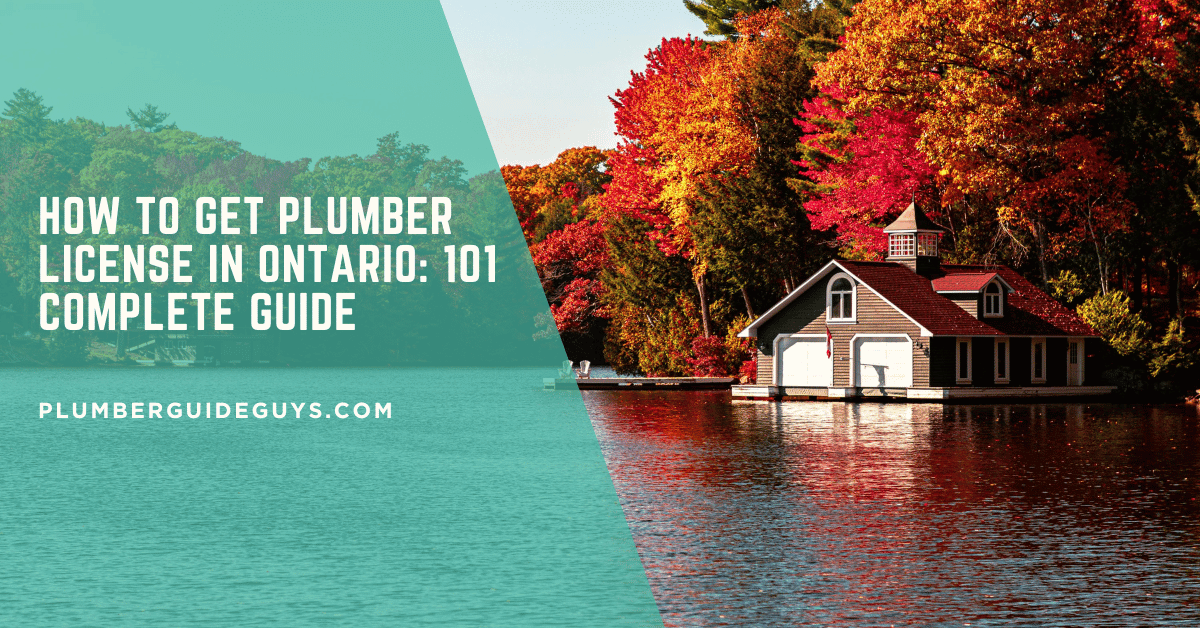Affiliate Disclosure
Plumber Guide Guys is a participant in the Amazon Services LLC Associates Program, an affiliate advertising program designed to provide a means for sites to earn advertising fees by advertising and linking to Amazon.
How to Get Plumber License in Ontario? Did you know Ontario’s plumbing industry makes over $2.5 billion a year? Licensed plumbers are in big demand. Getting a plumber license in Ontario is your first step to a rewarding career in this key trade.

Understanding the ontario plumber certification requirements can seem tough. But this detailed guide will simplify every step of the licensing process. It’s perfect whether you’re new to plumbing or an experienced pro looking for official certification. You’ll get all the info you need to start your career.
The Ontario College of Trades is key in setting and enforcing plumbing standards. This guide will take you through the whole licensing journey. You’ll learn about education, apprenticeships, and getting your final certification.
Key Takeaways
- Complete mandatory apprenticeship training
- Pass the official licensing examination
- Meet Ontario College of Trades requirements
- Understand specific documentation needed
- Prepare for ongoing professional development
Understanding Plumbing Licensing Requirements in Ontario
Getting into plumbing in Ontario means knowing the rules. To be a pro plumber, you need to follow certain steps and meet specific needs. This ensures top-notch service and high standards.
The rules for plumbing licenses in Ontario are strict. They help keep the trade at its best. To get and keep a license, you must meet certain criteria.
Types of Plumbing Licenses
Ontario has different plumbing licenses:
- Apprentice Plumber: For those starting out
- Journeyperson Plumber: For those with more experience
- Master Plumber: The highest level
Legal Framework and Regulations
The Ontario College of Trades sets the rules for plumbing. These rules make sure plumbers are skilled and safe.
“Professional standards protect both practitioners and consumers in the skilled trades.” – Ontario Trades Commission
Ontario College of Trades Role
The Ontario College of Trades is key in plumbing. They handle licenses, set education standards, and help plumbers grow.
Knowing these rules helps you succeed in plumbing in Ontario. It’s a dynamic field with lots of opportunities.
Prerequisites for Obtaining a Plumber License
To become a licensed plumber in Ontario, you must meet certain requirements. These ensure you’re ready for a career in plumbing. Your journey starts with understanding the key steps to a successful plumbing career.
Before starting a plumbing apprenticeship in Ontario, you need to meet several important qualifications:
- Minimum age requirement of 18 years old
- High school diploma or equivalent educational credential
- Physical fitness to perform demanding technical work
- Clean criminal background check
Educational requirements are key to getting your plumber license. If you trained internationally, you must get an Educational Credential Assessment (ECA). This step validates your training against Ontario’s standards.
Knowing the Ontario plumbing code is essential for your license. You must show you understand local rules, safety, and technical standards. This includes:
- Comprehensive understanding of provincial plumbing codes
- Knowledge of current building and safety regulations
- Familiarity with technical installation standards
Pro tip: Start preparing early by reviewing the latest Ontario plumbing code requirements and gathering all necessary documentation before applying for your apprenticeship.
Successful plumbers combine technical skills, regulatory knowledge, and professional dedication to excel in their trade.
How to Get Plumber License in Ontario
Getting a journeyman plumber license in Ontario needs careful planning and knowing the rules. You must go through several important steps to legally work as a plumber in the province.
Application Process Overview
To get a plumber license in Ontario, you must follow a set process. This path has many stages to check if you meet the professional standards.
- Submit official application to Ontario College of Trades
- Provide detailed documentation
- Complete needed apprenticeship hours
- Pass required certification exam
Required Documentation
Your application for a journeyman plumber license needs certain documents. Make sure you have these important papers ready before you apply:
- Proof of finished apprenticeship program
- Valid government ID
- Educational records
- Forms to verify work experience
Fee Structure and Payment Methods
Knowing the cost of getting licensed is key for future plumbers. The Ontario College of Trades offers various ways to pay, to fit everyone’s needs.
| License Type | Application Fee | Payment Methods |
|---|---|---|
| Apprentice Plumber | $125 | Credit Card, Online Banking |
| Journeyman Plumber | $250 | Credit Card, Debit, Electronic Transfer |
Pro tip: Always keep copies of your submitted documents and payment receipts for your records.
Educational Requirements and Training Programs
To become a licensed plumber in Ontario, you need a mix of theory and practice. Your journey begins with learning the basics for a plumbing career.
A plumbing apprenticeship in Ontario is a structured way to learn the trade. It combines classroom lessons with real-world training. This ensures you get the skills to meet Ontario’s plumbing code.
- Typical program duration: 4-5 years
- Classroom learning: 720-840 total hours
- On-the-job training: Approximately 8,000 hours
Key parts of a plumbing apprenticeship include:
- Technical safety training
- Blueprint reading
- Mathematics for plumbing
- Pipe system design
- Ontario plumbing code interpretation
“The most successful plumbers combine technical knowledge with practical problem-solving skills.” – Professional Trades Association
Your training will focus on important areas. You’ll learn about complex plumbing systems, safety, and industry standards. This prepares you for professional certification.
| Program Type | Duration | Key Focus |
|---|---|---|
| Apprenticeship | 4-5 years | Comprehensive trade skills |
| College Certificate | 1-2 years | Foundational technical knowledge |
| Vocational Training | 6-12 months | Specialized skill development |
Pro tip: Choose a training program accredited by recognized trade organizations to maximize your learning and career opportunities.
Plumbing Apprenticeship Program Structure
Starting a plumbing apprenticeship in Ontario is a step towards becoming a skilled plumber. The program mixes hands-on training with in-depth classroom learning. This ensures you get the skills needed to succeed in this important trade.
Duration and Hours Required
The plumbing apprenticeship in Ontario usually lasts 4-5 years. You’ll need about 8,000 hours of training. These hours are split between practical work and classroom learning.
- On-the-job training: 6,000 hours
- Technical classroom instruction: 2,000 hours
- Minimum apprenticeship duration: 4 years
On-the-Job Training Components
Your practical training lets you work with experienced plumbers. You’ll learn by doing in homes, businesses, and factories. You’ll also learn about the Ontario plumbing code in real situations.
- Install plumbing systems
- Read and interpret technical blueprints
- Perform maintenance and repairs
- Learn safety protocols
Classroom Instruction Requirements
Technical training gives you the theoretical knowledge you need. You’ll learn about plumbing systems, rules, and standards in class. These sessions cover important parts of the Ontario plumbing code, helping you understand the legal and practical sides of plumbing.
- Plumbing mathematics
- Technical drawing
- Code compliance
- Advanced system design
Pro tip: Keep detailed records of your apprenticeship hours and training. This will help you when you apply for your license.
Red Seal Certification Process

The plumber Red Seal certification is the top honor for plumbers in Canada. It lets you work in any province without needing more tests. This is a big step in your career as a journeyman plumber in Ontario.
To get your Red Seal certification, follow these steps:
- Complete a recognized apprenticeship program
- Accumulate required on-the-job training hours
- Pass the Red Seal examination
- Show you know national plumbing standards
The Red Seal exam checks your skills in many areas. It makes sure you meet high professional standards. If you pass, you get a badge that shows you’re a top-notch plumber.
| Certification Requirement | Details |
|---|---|
| Apprenticeship Hours | Minimum 6,000 documented work hours |
| Exam Format | Multiple-choice, computer-based test |
| Passing Score | 70% or higher |
| Certification Validity | Valid across all Canadian provinces |
With your Red Seal certification, you open up more job chances. You show you’re really good at plumbing.
Preparing for the Plumber Licensing Exam
To pass the plumber exam in Ontario, you need a solid plan and a deep understanding of plumbing. Knowing the ontario plumbing code requirements is key.
Getting ready for the exam means using different strategies. You need to learn the material well and feel confident.
Essential Study Materials
Collect top-notch study materials that cover important plumbing topics:
- Official Ontario Plumbing Code manual
- Technical trade textbooks
- Online learning platforms
- Professional training guides
Practice Test Strategies
Staying ready for the exam means practicing a lot. Look for sample questions that are similar to the real exam.
| Exam Component | Focus Areas | Recommended Study Time |
|---|---|---|
| Technical Knowledge | Plumbing systems | 40-50 hours |
| Code Requirements | Ontario Plumbing Standards | 30-40 hours |
| Practical Applications | Problem-solving scenarios | 20-30 hours |
Exam Format Insights
The exam will have multiple-choice questions. They’ll test your technical skills, safety knowledge, and code understanding. Make sure to read carefully and solve problems step by step.
With thorough preparation, what seems hard becomes doable. You’ll be on your way to getting certified.
Understanding Ontario Plumbing Code Requirements
The Ontario Plumbing Code is key for plumbing standards in the province. It’s essential for those wanting to become plumbers in Ontario. Knowing these rules is a must for your plumbing career.
This code gives detailed guidelines for safe and efficient plumbing systems. It covers many areas, like how to install pipes and what materials to use.
- Establishes minimum performance standards for plumbing systems
- Defines acceptable materials and installation methods
- Provides safety protocols for residential and commercial plumbing
- Outlines specific requirements for different types of plumbing projects
Important parts of the Ontario Plumbing Code include:
- Pipe sizing and material selection
- Drainage and venting requirements
- Water supply system specifications
- Fixture installation standards
Knowing these standards well is key for your plumbing license. Plumbers need to understand these rules to keep people safe and do quality work.
“Understanding the code is not just about passing an exam—it’s about protecting public health and ensuring reliable infrastructure.” – Ontario Plumbing Professionals Association
License Renewal and Continuing Education

To keep your plumber license in Ontario, you must follow renewal rules and keep learning. The Ontario College of Trades plumbing certification needs your active participation to stay valid.
Renewal Deadlines and Fees
Renewing your plumber license is a big deal. Here’s what you need to do:
- Renew your license every year before it expires
- Pay the renewal fee
- Show proof of continuing education credits
Continuing Education Requirements
To stay up-to-date in plumbing, you need to complete certain credits. The Ontario College of Trades plumbing rules say you must:
- Get 8-12 hours of approved training each year
- Take courses on updated building codes
- Improve your technical skills
- Attend safety and compliance workshops
Professional Development Opportunities
Good plumbers keep learning. Here are some ways to grow:
- Technical workshops from industry groups
- Online certification courses
- Advanced training in specialties
- Seminars on new technologies
By managing your license renewal well, you stay ahead in Ontario’s plumbing field.
International Credentials and Recognition
If you’re a plumber from abroad wanting to work in Ontario, it might seem tough. The province has rules to make sure your skills match local standards.
To start, you must get an Educational Credential Assessment (ECA). This step is key. It checks if your plumbing skills from abroad are good enough for Ontario.
- Get an ECA from a trusted group
- Show your plumbing skills from abroad
- Prove you’re as good as local plumbers
- Do extra training if needed
The assessment includes:
- Send in your school papers
- Show your work experience
- Get your skills checked
- Do any extra training
Tip: Contact the Ontario College of Trades for specific guidance on international credential recognition in the plumbing trade.
Your experience is important. Even though you might need to do more, Ontario has ways for you to join the local plumbing team.
Career Advancement and Specialization Options
After you finish your plumbing trade qualification in Ontario, you’ll find many exciting career paths. The plumbing world is full of chances for skilled people to grow their knowledge.
Your apprenticeship training in Ontario gives you a strong base to explore different career paths. Here are some advanced career options to consider:
- Master Plumber Certification – Reach the top of your profession with advanced credentials
- Specialized System Installations
- Medical Gas Systems
- Fire Protection Systems
- Industrial Pipeline Networks
- Commercial and Residential Project Management
- Independent Entrepreneurship
To move up in your plumbing career, keep learning and improve your skills. Important steps include:
- Get more certifications
- Go to advanced technical workshops
- Connect with other industry experts
- Keep up with new technologies
Fields like green technology, sustainable infrastructure, and advanced industrial systems offer great chances for those who are eager. Your first plumbing qualification is just the start of an amazing career journey.
“Success in the plumbing trade comes from continuous learning and adaptability.” – Professional Trades Association
Conclusion
Getting a plumber license in Ontario takes hard work, smart planning, and a drive to grow professionally. Your path to becoming a licensed plumber is filled with challenges. You’ll need to carefully follow the ontario plumber certification requirements.
Every step, from apprenticeship to the licensing exam, boosts your skills and reputation. This journey is not easy, but it’s worth it.
The steps to get a plumber license in Ontario require patience and focus. You’ll spend time on education, hands-on training, and keeping up with plumbing rules. This dedication will make you stand out in the trade.
Success in plumbing is more than just getting certified. It’s about always learning, doing great work, and knowing Ontario’s plumbing laws well. Your license shows you’re skilled and dedicated to being the best in plumbing.
Your plumbing career is always growing. Keep learning, stay curious about new methods, and see your license as the start of a fulfilling career in the trades.
FAQ
How long does it take to become a licensed plumber in Ontario?
What are the minimum requirements to start a plumbing apprenticeship in Ontario?
How much does it cost to get a plumber license in Ontario?
How long does it take to become a licensed plumber in Ontario?
What are the minimum requirements to start a plumbing apprenticeship in Ontario?
How much does it cost to get a plumber license in Ontario?
FAQ
How long does it take to become a licensed plumber in Ontario?
It takes about 4-5 years to become a licensed plumber in Ontario. You need to complete a 4-year apprenticeship. This includes 8,000 hours of on-the-job training and 720 hours of classroom work. After the apprenticeship, you must pass a provincial exam to get your journeyman plumber license.
What are the minimum requirements to start a plumbing apprenticeship in Ontario?
To start a plumbing apprenticeship, you must be 16 or older. You also need a high school diploma or equivalent. You must be legally allowed to work in Canada. You’ll also need to register with the Ontario College of Trades and find a sponsor.
How much does it cost to get a plumber license in Ontario?
The cost varies but includes fees for registration, exams, and licensing. You might also spend money on tools and training. The total cost can be between
FAQ
How long does it take to become a licensed plumber in Ontario?
It takes about 4-5 years to become a licensed plumber in Ontario. You need to complete a 4-year apprenticeship. This includes 8,000 hours of on-the-job training and 720 hours of classroom work. After the apprenticeship, you must pass a provincial exam to get your journeyman plumber license.
What are the minimum requirements to start a plumbing apprenticeship in Ontario?
To start a plumbing apprenticeship, you must be 16 or older. You also need a high school diploma or equivalent. You must be legally allowed to work in Canada. You’ll also need to register with the Ontario College of Trades and find a sponsor.
How much does it cost to get a plumber license in Ontario?
The cost varies but includes fees for registration, exams, and licensing. You might also spend money on tools and training. The total cost can be between $1,000 and $3,000.
What is the Red Seal certification, and is it mandatory in Ontario?
The Red Seal certification shows you meet Canadian standards. It’s not mandatory but highly recommended. It lets you work as a plumber in any province without extra tests. To get it, you need to pass the interprovincial Red Seal exam after getting your journeyman plumber certification.
Can I become a plumber if I have international credentials?
Yes, but you’ll need to have your credentials evaluated. You might need to complete bridging programs and pass the Ontario plumbing exam. The Ontario College of Trades will check your education and experience for any extra steps.
What are the continuing education requirements for licensed plumbers in Ontario?
Licensed plumbers must keep their skills up to date. This means earning continuing education credits and staying current with the Ontario Plumbing Code. You might also need to attend workshops or training sessions.
What is the difference between an apprentice, journeyman, and master plumber in Ontario?
An apprentice is learning the trade. A journeyman has completed their apprenticeship and passed the exam. A master plumber has more experience and can work independently and manage projects.
How often do I need to renew my plumber license in Ontario?
You need to renew your plumber license every 2-3 years. You’ll need to pay a fee and show proof of continuing education. The Ontario College of Trades manages the renewal process.
,000 and ,000.
What is the Red Seal certification, and is it mandatory in Ontario?
The Red Seal certification shows you meet Canadian standards. It’s not mandatory but highly recommended. It lets you work as a plumber in any province without extra tests. To get it, you need to pass the interprovincial Red Seal exam after getting your journeyman plumber certification.
Can I become a plumber if I have international credentials?
Yes, but you’ll need to have your credentials evaluated. You might need to complete bridging programs and pass the Ontario plumbing exam. The Ontario College of Trades will check your education and experience for any extra steps.
What are the continuing education requirements for licensed plumbers in Ontario?
Licensed plumbers must keep their skills up to date. This means earning continuing education credits and staying current with the Ontario Plumbing Code. You might also need to attend workshops or training sessions.
What is the difference between an apprentice, journeyman, and master plumber in Ontario?
An apprentice is learning the trade. A journeyman has completed their apprenticeship and passed the exam. A master plumber has more experience and can work independently and manage projects.
How often do I need to renew my plumber license in Ontario?
You need to renew your plumber license every 2-3 years. You’ll need to pay a fee and show proof of continuing education. The Ontario College of Trades manages the renewal process.

